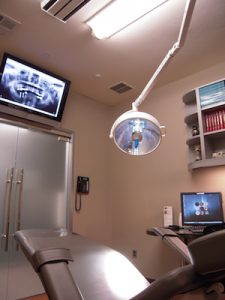Care After Tooth Extraction
After tooth extraction, it’s important for a blood clot to form to stop the bleeding and begin the healing process. That’s why we ask you to bite on a gauze pad for the 60 minutes after your surgery. If the bleeding or oozing still persists, place another gauze pad and bite firmly for another 60 minutes. You may have to do this several times.

After the blood clot forms, it is important not to disturb or dislodge the clot as it aids healing. Do not rinse vigorously, suck on straws, smoke, drink alcohol or brush teeth next to the extraction site until we see you back for your first post-operative appointment. These activities will dislodge or dissolve the clot and retard the healing process. Limit vigorous exercise until we see you back for your first post-operative appointment. Any increase in blood pressure and may cause more bleeding from the extraction site, leading to other complications.
After the tooth is extracted you may feel some pain and experience some swelling. As mentioned before, Swelling is a normal occurrence after surgery, as its the body’s natural healing mechanism. The majority of the swelling does not appear until at least 3-5 days after surgery. This is why for the first 2-3 days we recommend applying the provided compression dressing with refreezable ice packs, to the cheek area; in order to prevent the eventual swelling. If no compression dressing is available an unopened bag of frozen peas or corn applied to the area will keep swelling to a minimum.
Use the pain medication as directed. Call the office if the medication doesn’t seem to be working. If antibiotics are prescribed, continue to take them for the indicated length of time, even if signs and symptoms of infection are gone. Drink lots of fluid and eat nutritious soft food on the day of the extraction.
It is important to resume your typical oral hygiene routine after surgery. This should include brushing and flossing the rest of your teeth after each meal, while avoiding the surgical sites. This will speed healing and help keep your mouth fresh and clean.
After a few days you should notice an improvement in your symptoms, However, if at any point you have anything out of the ordinary, i.e. increasing pain, bleeding, fever/chills, nausea/vomiting, please call our office 408-253-6084.
Care for Multiple Tooth Extraction
A small amount of bleeding is to be expected following any oral surgical procedure.. If bleeding occurs, place a gauze pad directly over the bleeding socket and apply biting pressure for 60 minutes. If the bleeding or oozing still persists, place another gauze pad and bite firmly for another 60 minutes. You may have to do this several times. If the bleeding continues, always call the office first. As a last resort you may place a moist tea bag in the surgical site and firmly bite down but this is only to be done as as last resort. There is a chemical in the tea leafs that slows down the bleeding. Avoid hot liquids, strenuous exercise, and try to elevate the head at night time to reduce swelling and bleeding. If bleeding persists, call our office immediately.
In special circumstances, when we remove all the remaining teeth, you will be provided with an “Immediate Denture” . Do not remove immediate denture for the first 24 hours unless the bleeding is severe. Expect some oozing around the side of the denture. The denture itself will act as a compression device on the gums to reduce the bleeding, this is the reason why it is recommended to keep the denture in place for the first 24 hours. Then it is okay to remove it for a short period of time to clean it, then replace it back into the mouth immediately.
Use ice packs (externally) on the same side of the face as the operated area. Apply ice for the first 2-3 days after surgery. Apply ice continuously while you are awake.
For severe pain use the prescription given to you. If the pain does not begin to subside in 2 days, or increases after 2 days, please call our office. If an antibiotic has been prescribed, finish your prescription regardless of your symptoms.
Drink plenty of fluids. If many teeth have been extracted, the blood lost at this time needs to be replaced. Drink at least six glasses of liquid the first day.
Do not rinse your mouth for the first post-operative day, or while there is bleeding. After the first day, use peridex mouthwash or warm salt water rinse every 4 hours and following meals to flush out particles of food and debris that may lodge in the operated area. (One half teaspoon of salt in a glass of lukewarm water.). After you have seen your dentist for denture adjustment, take out denture and rinse 3 to 4 times a day.
Restrict your diet to liquids and soft foods, which are comfortable for you to eat. As the wounds heal, you will be able to advance your diet.

The removal of all the teeth at the same time is quite different than the extraction of one or two teeth. Because the bone must be shaped and smoothed prior to the insertion of a denture, the following conditions may occur, all of which are considered normal:
- The area operated on will swell reaching a maximum in two days. Swelling and discoloration (bruising) around the eye may occur. The application of a moist warm towel will help eliminate the discoloration quicker.
- A sore throat may develop. The muscles of the throat are near the extraction sites. Swelling into the throat muscles can cause pain. This is normal and should subside in 2-3 days.
- If the corners of the mouth are stretched, they may dry out and crack. Your lips should be kept moist with an ointment like Vaseline. There may be a slight elevation of temperature for 24-48 hours, as the body’s immune system protects the surgical site. If temperature continues to increase and stays above 101.5 for more than three hours, then notify our office.
PLEASE NOTE: With immediate dentures there is almost always the need for further adjustment of the actual denture itself and/or sore spots in the mouth. In most cases, your dentist will see you within 24-48 hours after surgery and make the necessary adjustments to relieve those sore spots. Failure to do so may result in severe denture sores, which may prolong the healing process.
